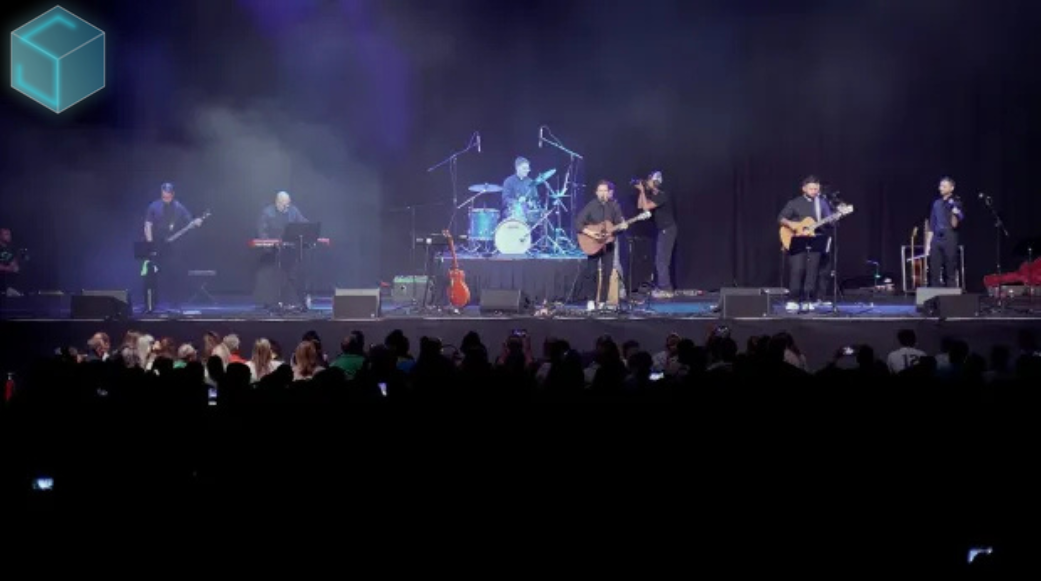
August 20, 2025
Imagine six Catholic priests performing at a sold-out Houston show instead of a well-known pop star. Their band's performance combined messages of prayer, celibacy, and faith with elements of rock...
Read more.png)
August 20, 2025
Nostalgia, Mother Mother’s latest album, is one of those rare creations. It invites us into a world where lightness isn’t escapism—it’s a form of resistance, a beacon of hope, and a path forward....
Read more
August 19, 2025
When Anna of the North released “Lovers” in 2017, it was already a dreamy synth-pop gem, filled with wistful vocals and lush production that captured the ache of young romance. But it wasn’t until...
Read more
August 19, 2025
“Let Me Know” ft. Future started out as a moody, late-night playlist type of track, the kind you blast in your car pretending you’re in a music video while stuck in traffic. But now? It’s become...
Read more
August 19, 2025
“Your Idol” stands out in Kpop Demon Hunters not just as a catchy track, but as one of the most self-aware songs in the whole project. At first listen, it has all the hallmarks of a classic K-pop...
Read more
August 19, 2025
If you’ve scrolled TikTok, Insta, or literally any corner of the internet in the past few weeks, you’ve probably heard it: the fizzy, feel-good bop known as “Soda Pop” by the Saja Boys. Straight...
Read more
August 19, 2025
Skai Is Yourgod didn’t just drop a song, he dropped a cultural grenade. His track “Stacks From All Sides” has taken TikTok by storm, and the secret sauce? A cheeky little sample from Beetle on...
Read more
August 19, 2025
After 70 weeks at No. 1 with “Too Sweet,” Hozier’s reign on Billboard’s Hot Rock Songs chart comes to an end as newcomer Sombr takes over with...
Read more
August 19, 2025
Charli XCX brought her groundbreaking Brat era to a poignant close Friday night during an electrifying performance at South Korea's One Universe Festival. The pop innovator marked the final...
Read more
August 19, 2025
Taylor Swift’s appearance on Travis and Jason Kelce’s New Heights podcast drew 1.3M live viewers, breaking YouTube records and sparking buzz with details about her new album The Life of a...
Read more
August 19, 2025
After a six-year silence, Chance the Rapper is officially back. On August 15, 2025, he will drop his sophomore album, Star Line, marking a new chapter filled with growth, travel, and creative...
Read more
August 19, 2025
Lana Del Rey’s new song takes aim at Ethel Cain, referencing an alleged personal rift involving Instagram posts, a mutual ex, and behind-the-scenes remarks...
Read more.png)
In today’s fast-paced, tech-driven music world, having musical talent is just the beginning. Technology has transformed the way music is produced, offering musicians unprecedented access to powerful tools like Digital Audio Workstations (DAWs), sampling, and Artificial Intelligence (AI). These innovations allow for greater creativity and efficiency but can also be overwhelming, especially if you’re unsure how to fully maximize their potential.
If you’re feeling like you’re not making the most of these tools, you’re not alone. Even accomplished musicians have faced this challenge. Let’s dive into how these technologies are changing the music industry and how you can use them to elevate your music, with insights from famous creators who have successfully harnessed them.
DAWs, such as Logic Pro, Ableton Live, and FL Studio, are the backbone of modern music production. They allow you to record, mix, and edit music digitally, offering endless possibilities for sound manipulation. But to truly maximize their potential, it’s essential to go beyond basic functions and dive deeper into their features.
What You Can Do:
Example: Deadmau5, a pioneering electronic music producer, is known for mastering his DAW, Ableton Live, which allows him to create highly complex tracks. By diving deep into the software, he’s been able to push the boundaries of electronic music and remain at the forefront of the genre.
Sampling has been a key component of music production for decades, but modern technology has made it easier than ever to incorporate samples into your work. Sampling lets you incorporate sounds from existing recordings into your music, creating entirely new textures and layers.
What You Can Do:
Example: Kanye West is renowned for his creative use of sampling. By taking classic soul or rock records and manipulating them through sampling and remixing, he has created iconic tracks that feel both familiar and groundbreaking. His use of technology to blend old and new sounds revolutionized hip-hop production.
AI is one of the most exciting advancements in music technology, offering tools that assist with everything from songwriting to mastering. While AI won’t replace human creativity, it can be a powerful ally in enhancing your creative process.
What You Can Do:
Example: Taryn Southern, a pop artist, made headlines for using AI to co-produce her album I AM AI. By using AI-driven tools, she was able to push the boundaries of traditional music production and incorporate unique soundscapes that would have been challenging to create manually. Her collaboration with AI is an example of how technology can be an extension of creativity, not a replacement.
One of the most significant impacts of technology in music is the ability to collaborate with musicians, producers, and engineers across the globe without ever meeting in person. Online platforms like Splice, Kompoz, and SoundBetter allow you to exchange ideas, share stems, and collaborate in real-time.
What You Can Do:
Example: Billie Eilish and her brother Finneas created much of her Grammy-winning album When We All Fall Asleep, Where Do We Go? in their bedroom studio. Even though their team grew globally, much of the production and collaboration was done remotely, proving that high-quality music can be made without traditional studio constraints, thanks to modern technology.
Gone are the days when you needed a room full of instruments to create a diverse sound palette. With the rise of virtual instruments and plugins, you have access to a vast array of sounds, from orchestral strings to cutting-edge synths, all at your fingertips.
What You Can Do:
Example: Hans Zimmer, one of the most influential film composers, uses a hybrid approach of traditional orchestration combined with virtual instruments and advanced plugins. This combination of real and digital sounds gives his scores a richness that has defined modern film music. Zimmer’s use of technology showcases how virtual tools can enhance even the most traditional music styles.
Technology has opened up a world of possibilities for musicians, but it can be overwhelming if you’re unsure how to use it effectively. By mastering your DAW, embracing sampling, exploring AI-driven tools, and collaborating remotely, you can unlock new levels of creativity. Remember, even the most successful musicians had to learn how to use these tools to their advantage.
Take inspiration from artists like Deadmau5, Kanye West, and Billie Eilish, who have embraced technology and pushed their craft to new heights. The key is to see technology as an extension of your creativity, not a replacement for it. By experimenting with these tools and staying curious, you’ll find new ways to express yourself and reach listeners around the world.